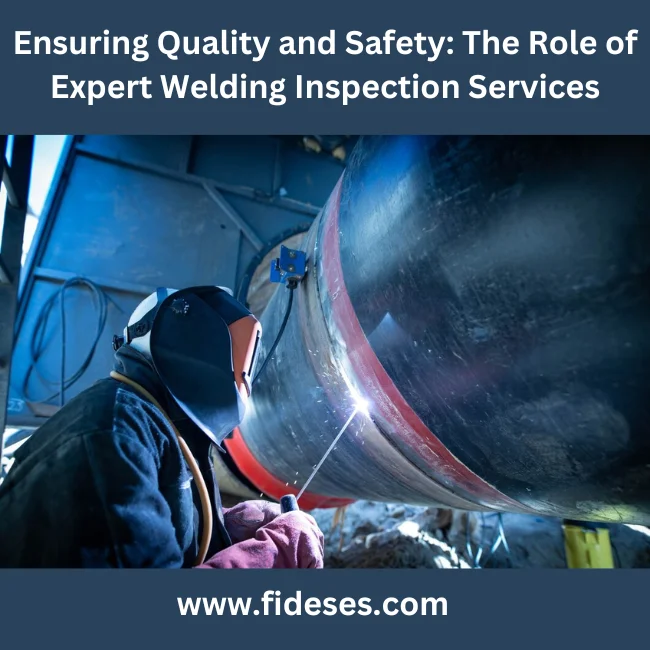The Impact of Rigorous Welding Evaluation on Industry Requirements: Promoting Security, Integrity, and Compliance Throughout Various Fields
The function of extensive welding inspection is increasingly recognized as a crucial part in boosting market standards, where safety, reliability, and conformity take precedence throughout diverse industries. What improvements might we prepare for in welding methods as the demand for top quality and security increases?
Relevance of Welding Assessments
Recognizing the essential function of welding evaluations in keeping high quality and security criteria, sector professionals focus on these evaluations to guarantee architectural stability. Welding evaluations work as an essential checkpoint in the manufacture procedure, determining problems that could compromise the durability and security of welded structures. By methodically analyzing welds, assessors can discover problems such as incomplete infiltration, porosity, and cracks, which might not show up to the nude eye.
The relevance of these inspections prolongs beyond mere conformity; they are important for protecting lives and safeguarding financial investments. In vital sectors such as manufacturing, aerospace, and building and construction, a single defective weld can bring about devastating failings, leading to both economic loss and human casualties. As a result, carrying out rigorous assessment procedures alleviates these threats and boosts total project reliability.
In addition, consistent welding examinations cultivate a society of high quality throughout organizations, encouraging welders to comply with ideal practices and keep high standards in their job. This commitment to high quality not just enhances functional efficiency but additionally enhances the track record of companies within their respective markets. Hence, welding evaluations are vital in promoting safety, integrity, and conformity throughout various sectors.
Key Sector Specifications and Regulations
The framework of welding examinations is underpinned by a robust collection of market requirements and policies that govern techniques across different markets. Secret establishments, such as the American Welding Culture (AWS) and the International Company for Standardization (ISO), establish standards that make sure high quality and security in welding procedures. For instance, AWS D1.1 outlines essential needs for welding steel structures, while ISO 3834 defines high quality requirements for blend welding.
In enhancement to these particular standards, market policies like the American National Criteria Institute (ANSI) and Occupational Security and Wellness Management (OSHA) mandates even more boost compliance by establishing security procedures and operational best techniques. These laws are essential in industries such as aerospace, manufacturing, and construction, where welding integrity is vital.
Additionally, sector-specific criteria, such as those from the American Culture of Mechanical Designers (ASME) for pressure vessels, supply additional layers of examination to make certain that welds meet strict safety and security and efficiency standards. Adherence to these standards not only assists in regulatory conformity but also fosters a society of quality and reliability throughout the welding sector, ultimately securing public welfare and boosting functional effectiveness.

Benefits of Compliance and Dependability
Consistently sticking to sector requirements and regulations in welding examinations yields significant advantages, boosting overall dependability and efficiency. The foremost advantage is the guarantee of quality in bonded joints, which directly adds to the safety of frameworks and tools. Conformity with well-known standards lessens the threat Bonuses of failure and catastrophic cases, therefore securing both human life and beneficial possessions.
Moreover, organizations that prioritize extensive welding inspections promote a culture of accountability and professionalism. This commitment not only reinforces the track record of the firm however likewise infuses confidence in stakeholders and customers pertaining to the honesty of product or services. Dependable welding procedures cause reduced prices connected with rework, repair services, and potential lawful obligations coming from substandard craftsmanship.
Additionally, keeping compliance with market criteria assists in smoother regulative interactions, as companies can readily demonstrate adherence to required protocols (Welding Inspection Gilbert Arizona). This positive approach can lead to useful partnerships and chances within the industry, in addition to access to new markets
Challenges in Welding Inspection
Navigating the complexities of welding evaluation provides a myriad of challenges that can hinder conformity with market standards. The absence of standard training for assessors can result in varied interpretations of inspection requirements, which may compromise safety and integrity.
Another challenge hinges on the accessibility of innovative inspection tools - Welding Inspection Gilbert Arizona. While modern technologies such as ultrasonic testing and radiography can improve discovery capacities, their implementation might be limited by cost or accessibility, why not try this out specifically in smaller procedures. This disparity can cause a reliance on much less efficient inspection methods, enhancing the risk of undiscovered flaws
Additionally, the busy nature of contemporary production commonly stress assessors to focus on rate over thoroughness, possibly ignoring essential issues. Governing compliance can be intimidating due to the advancing nature of market requirements, leaving organizations struggling to keep up with the latest needs. These challenges require continuous improvement in evaluation methods to ensure the integrity of welded frameworks across different fields.
Future Trends in Welding Practices
Arising modern technologies and evolving methodologies are readied to transform welding practices in the coming years. Developments in automation, such as robotic welding systems, are obtaining grip, boosting accuracy and effectiveness while reducing human mistake. These systems will not just speed up production but additionally promote constant quality control, addressing a few of the difficulties dealt with in hands-on welding.
Furthermore, the assimilation of expert system (AI) and equipment learning right into welding processes is poised to change inspection and monitoring. Real-time data analytics will make it possible for predictive maintenance, enabling aggressive treatments that lower downtime and rise safety. Enhanced truth (AR) and virtual reality (VR) modern technologies are becoming critical in training welders, providing immersive experiences that improve ability development without the threats linked with standard techniques.
Sustainability is likewise an essential pattern, as markets look for greener practices. The fostering of eco-friendly materials and approaches, along with energy-efficient equipment, will likely come to be standard. As markets adapt to these adjustments, the emphasis will move towards higher compliance with safety and security and ecological regulations, ensuring that welding practices not just meet present requirements yet additionally lead the means for a much safer and even more lasting future.

Final Thought
Finally, rigorous welding assessments dramatically enhance sector criteria by making certain security, dependability, and conformity across numerous industries. By systematically recognizing defects and adhering to established standards, these examinations minimize threats linked with structural failings. The promotion of responsibility amongst welders brings about better outputs, fostering trust within neighborhoods. As markets remain to prioritize operational integrity, the value of comprehensive evaluations will only raise, ultimately benefiting companies and society at large.
The duty Resources of strenuous welding evaluation is significantly identified as an important part in improving sector standards, where safety, integrity, and conformity take priority throughout varied markets. Thus, welding inspections are important in advertising security, dependability, and compliance throughout different sectors.
Trick institutions, such as the American Welding Society (AWS) and the International Company for Standardization (ISO), develop standards that make certain top quality and safety and security in welding procedures. AWS D1.1 details necessary demands for welding steel frameworks, while ISO 3834 defines high quality demands for combination welding.
In conclusion, extensive welding assessments dramatically boost sector criteria by guaranteeing safety and security, integrity, and compliance across numerous industries.